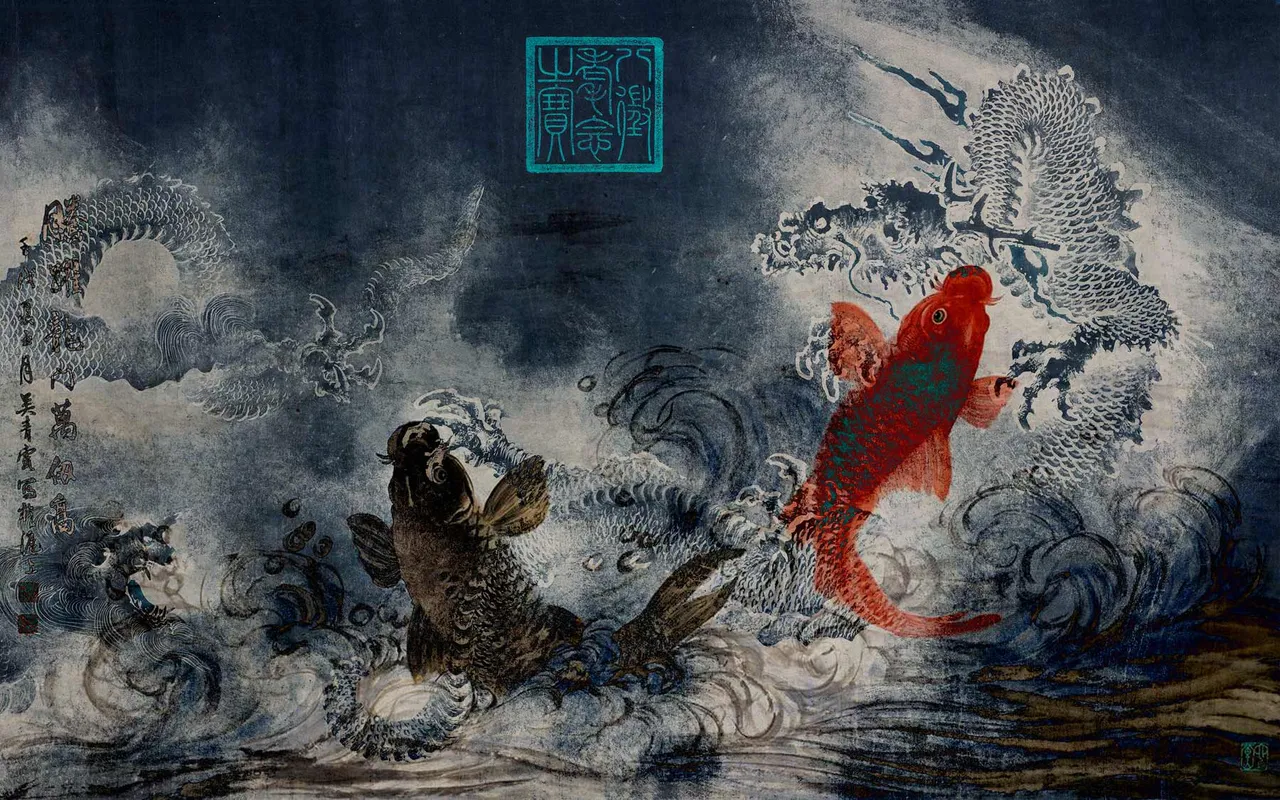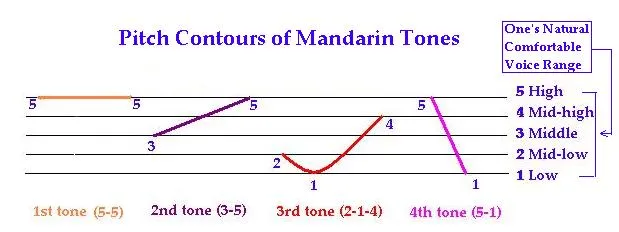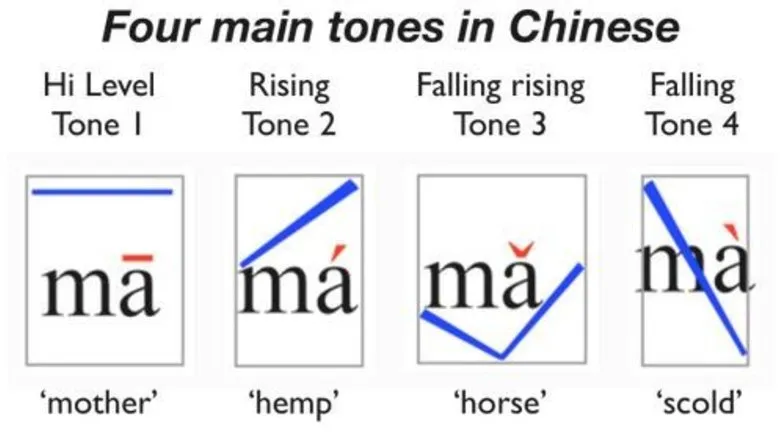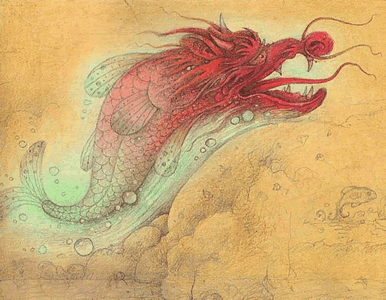
Source
There is an ancient tale for both Chinese and Japanese people which I count among my favorites, it is the one about how the Koi fish turned into a Long (Chinese dragon).
The myth tells us that on ancient times there was a group of Koi swimming uptrend in the Yellow River. When the group crossed with a waterfall most of the kois gave up due to the difficulty of overcoming the waterfall, but some decided to stay and try their best to jump in order to reach the top of the waterfall. A group of evil spirits were seeing the scene and laughed at the Kois jumping out of the water. The vicious spirits even increased the high of the waterfall just to make fun on the kois efforts. But the kois seemed undisturbed and continued to try with the same perseverance until one succeeded reaching the top of the waterfall. A merciful God was also watching the scene and rewarded the koi turning it into a mighty long that could fly all around the world to collect the pearls of wisdom. From that time on, every koi who succeed reaching the top of the waterfall was able to become a mighty Long.
Ever since, the Koi have been a symbol of perseverance and the effort to reach the most wanted goals.

I'm really grateful to every Steemian that took its time to drop by the post I made and wrote a comment about the proposal I made two weeks ago. There were 11 great steemians that are willing to enroll themselves in the interesting challenge that is learning Mandarin.
🐲They will be the new Longs🐲
 @preparedwombat |
 @moneymosey |
 @akasha7000 |
 @viking-ventures |
 @a0i |
 @georgelaine |
 @putu300 |
 @afiqsejuk |
 @metametheus |
 @abidemiademok21 |
 @takowi |
If this is the first time you are reading about this event, please drop by this post to read the introduction of this project.

Let's begin!
One of my best Chinese teachers told me that learning a language is like building a house to live in. Thus, the most crucial part is to build solid foundations. Continuing the analogy, she explained further that phonetics are the bases of the house and the new words that we learn (vocabulary) are the bricks. Therefore, this two elements shall be the main subjects on the first stages.
We'll start as we were little kids, first we shall learn how to perform Chinese sounds and how to name Chinese objects for the most common elements of our everyday routines. Then we will slowly start to create short phrases and so on.

Mandarin Chinese Phonetics
In order to start learning Mandarin phonetics, we will use the Chinese Romanization System called Pīnyīn (Romanization = "expressing the sounds of a language, which is unrelated to Latin, using the Latin alphabet"). Pīnyīn means spelling sounds and it is the system taught to Chinese children on mainland China when they are starting attending the primary school. (An interesting fact is that Mandarin only has 409 different sounds)
The Pīnyīn depicts how to say the basic unit of spoken Mandarin which are the syllables. They consist in an initial (consonant), a final (vowel), and a tone, there are syllables that may not have an initial, but a syllable will always have at least a final and a tone.
In Mandarin Chinese there are five different tones (sometimes they are referred to as four tones and a neutral tone).

The numeral notation indicates the relative high of each tone within our natural voice range. Source
The tones are depicted within our natural voice range, within that interval the first tone is a high and flat pitch, the second tone us a rising pith, the third tone is first a descending then a rising pitch (in natural spoken language it occurs mostly as a descending soft tone called half third tone), and the fourth is a sharp descending pitch.
Learning how to properly make the tones in Mandarin is of paramount importance since a slight variation on the intonation of a word may change its meaning entirely. For instance:

Source
So you can end up speaking about drugs when you intended to speak about your mother if you don't pay attention to the tones 😂😂

Do we have tones in English?
In English there are some examples of the exact same word whose meaning changes with the intonation we use. If we say yes with a sharp short intonation everybody will know that we are affirming a fact with emphasis. But if we say yes with a rising intonation, you can agree that speaker may be expressing a certain degree of doubt and that he is expecting to receive confirmation of whether or not his assumption was correct.

So much for theoretical description, let's go into the practice!
I highly recommend to drop by the chart in this link, it contains all possible Chinese combinations of initials and finals with the four tones, you just have to click on them and the four different possibilities will be displayed. Some even have short video demonstrations.
I have chosen this learning material because, among the many native Chinese speakers that I have seen sharing their knowledge, the woman from this video has a very well pronounced and fluent English which is really cool.
Here you have a sample of her explaining the tones:
All video credits belongs to yoyochinese.com if you want to explore more of their content feel free to visit their Youtube channel

What are the learning goals and which will be the SBI challenge?
I'll ask you guys to review extensively the learning material from above, the first goal will be to differentiate the tones. Just that, during this week I will ask you to train yourselves so you can differentiate al Mandarin tones. If there is any question, feel free to post a comment on this post, I will answer ASAP.
Finally, at the end of the week I will post a comment on this post with the first learning challenge from which SBI winners will be chosen in accordance with their performance. The task will be a surprise no spoilers will be provided 😏
The challenge will be intended to have as much fun as possible so at the end everyone feels satisfied with the result. Of course, those who effort the most will be rewarded as follows:
- First place 3SBI
- Second place 2SBI
- Third place 1SBI
Edited: If you don't have an Instagram or Twitter account or you are just unwilling to use your personal social media to advertise Steem, you may spread the word of the platform to some of your friends, your relatives, or anyone you like. The idea is to contribute to the growth of this wonderful platform from which we all benefit.Also, please provide some proof that you are a real user and no some random guy with multiple accounts. This is done in order to prevent users from farming this contest.

Feel free to reach me on Discord any time (joelsegovia#9444)
Greetings
☯ ☯ ☯ ☯ ☯


